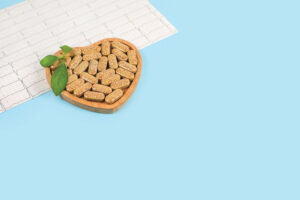L-arginine is an amino acid necessary for protein synthesis. It is found naturally in foods such as red meat, poultry, fish and dairy products.1 Although the body can synthesize it, L-arginine is considered a semiessential amino acid. The reason is that dietary intake remains the primary contributor of L-arginine levels since the rate of Larginine synthesis does not increase to compensate for depletion or inadequate supply.2,3 Hence, there are times during which supplementation may be beneficial. In fact, research suggests that there are a number of different situations in which supplementation may be quite beneficial. Before reviewing that research, let’s first take a look at the role that L-arginine plays in the body.
L-arginine’s Role in the Body
L-arginine is involved in numerous areas of human biochemistry, including ammonia detoxification, hormone secretion and immune modulation. It is best known, however, for its effects on the vascular system. Specifically, L-arginine is metabolized via the enzyme nitric oxide synthase into nitric oxide (NO), which causes blood vessel relaxation (vasodilation).4 Consequently, through its role as an NO precursor, L-arginine offers many benefits for cardiovascular health.
L-arginine is also metabolized to L-ornithine, then to L-proline, which is used in collagen synthesis and wound healing.5 The oral bioavailability of L-arginine is 68 percent and it has an elimination half-life of approximately 80 minutes.6
Cardiovascular Health
As previously stated, L-arginine’s role as an NO precursor offers many benefits for cardiovascular health. This includes benefits in the treatment of angina, congestive heart failure, hypertension and peripheral artery disease.
• Angina: Angina pectoris is a clinical syndrome that occurs when low blood flow to the heart limits delivery of oxygen to the heart muscle during exertion. Taking 6-18 g of L-arginine daily has been shown to decrease symptoms and improve exercise tolerance and quality of life in patients ranging in angina severity from occurring only with strenuous activity, to occurring at rest.7-9 This includes a reduction in inflammation10 and improvements in flow-mediated vasodilation.11 Also, some patients with angina who have frequent attacks at rest despite treatment with standard antianginal drugs, also experienced benefits from supplementation with L-arginine.12
• Congestive Heart Failure: Congestive heart failure (CHF) is a condition in which there is an inability of the heart to provide sufficient pump action to distribute blood flow to meet the needs of the body. A six-week, randomized, double- blind trial13 found that daily supplementation with 5.6-12.6 g of L-arginine significantly improved blood flow, arterial compliance and functional status compared to placebo in patients with CHF. Another double-blind trial found that supplementation with 15 g L-arginine daily improved kidney function in people with CHF.14
• Hypertension: Small studies in both healthy individuals and hypertensive individuals with type 2 diabetes have benefited from L-arginine supplementation. In healthy subjects, an arginine-rich diet and supplementation with L-arginine lowered blood pressure and resulted in a fall in fasting blood glucose levels. 15 In type 2 diabetes mellitus and mild hypertension, 3 g of L-arginine per hour for 10 hours (for two days) resulted in a drop in diastolic blood pressure two hours after starting L-arginine and returning to normal within one hour of stopping the arginine.16 Other research suggest that L-arginine supplementation may also improve the effect of angiotensin converting enzyme (ACE) inhibitors in treating hypertension.17
• Peripheral Arterial Disease: Also known as peripheral vascular disease, peripheral arterial disease is the medical name given to a group of problems with poor circulation to the feet and legs. One of the first recognizable symptoms of peripheral arterial disease is intermittent claudication—basically pain or cramps in the leg muscles on walking that goes away completely after a few minutes rest. In double-blind research18, patients with intermittent claudication treated with 6 g supplemental L-arginine daily experienced improved the pain-free walking distance by 230 percent and the absolute walking distance by 155 percent. L-arginine also improved vasodilation and restored NO formation.
Erectile Dysfunction
Besides its effect on the cardiovascular system, NO also increases the relaxation of urinary tract smooth muscle and is involved in erectile function.19,20 In fact, medications like sildenafil citrate (Viagra®) stimulate erections primarily by enhancing signaling of the NO pathway in the penis. Hence, it is no surprise that L-arginine has shown benefit in the treatment of erectile dysfunction (ED), previously known as impotence.
In a six-week, prospective, randomized, double-blind, placebo-controlled study21, 50 men with ED were treated with 5 g L-arginine daily or placebo. Thirty-one percent of the patients receiving the L-arginine had initial low levels of NO. Those patients reported a significant subjective improvement in sexual function, and their NO doubled by the end of the study. In another placebo-controlled study22, 15 impotent men were treated with 2.8 g L-arginine daily for two weeks. Those with initial low NO levels (40 percent) experienced significant improvements in sexual function, including improvement in erections. Lower doses of L-arginine alone do not seem to be effective for ED. For example, in one study, 1,500 mg L-arginine daily was ineffective in treating men with mixed-type impotence.23
However, when a lower dose of L-arginine was combined with Pycnogenol® (a proprietary pine bark extract), the story changes. In a threemonth study24, 40 men with ED were initially treated with 1,700 mg of L-arginine daily for one month. At that point in time, only five percent of the men achieved normal erectile function. But during the second month, 80 mg of Pycnogenol daily was added. The result was that 80 percent of the men reported normal erections. The advantage of using L-arginine together with pine bark extract was evident. In fact, the authors of the study concluded that this combination resulted in a significant improvement in sexual function in men with ED, without any side effects.
In another study25, 50 patients with mild to moderate ED were treated for one month with L-arginine and Pycnogenol. At the conclusion of the treatment period, men treated with this combination reported restored erectile function to normal. On aver-age, it took approximately five days for the combination of L-arginine and Pycnogenol to improve erectile function. In addition, the frequency with which the men had sexual intercourse doubled. The men also experienced improvements in orgasmic function and sexual desire. In a six-month study26, 124 patients with moderate ED received the L-arginine/ Pycnogenol combo daily. The results not only included significant improvements in erectile function, but also a significant increase in total testosterone levels.
Athletic Performance
Dietary supplements containing L-arginine have been marketed with the purpose of increasing vasodilation, thereby elevating blood flow to the exercising muscle and enhancing the metabolic response to exercise. This was tested in a randomized, double- blind, placebo-controlled study27 of exercising men supplemented with 6 g of L-arginine or placebo. Results showed that L-arginine increased blood volume. In another study28 with seven physically active males, L-arginine hydrochloride capsules (7.2 g daily for 14 days) significantly increased the rate VO2 response (the capacity of an individual’s body to transport and use oxygen during exercise) by 12 percent at the onset of moderate-intensity exercise in humans.
Other Research
• AIDS-related wasting. Supplementation with L-arginine in combination with hydroxymethylbutyrate (HMB) and glutamine helps increase body weight, particularly lean body mass, and positively affects immune status in patients with HIV/AIDS.29
• Interstitial cystitis (aka, bladder pain syndrome). Supplementation with L-arginine help reduce symptoms, especially pain associated with interstitial cystitis.30
• Dementia. Supplementation with L-arginine may help improve senile dementia.31
• Migraine headache. Supplementation with L-arginine in combination with ibuprofen may help effectively treat migraine headaches, reducing pain intensity within 30 minutes of administration.32
References:
1 Tenenbaum A, Fisman EZ, Motro M. L-arginine: Rediscovery in progress. Cardiology, 1998;90:153-9.
2 Castillo L, Chapman TE, Sanchez M, et al. Plasma arginine and citrulline kinetics in adults given adequate and arginine-free diets. Proc Natl Acad Sci USA, 1993;90:7749-7753.
3 Castillo L, Ajami A, Branch S, et al. Plasma arginine kinetics in adult man: response to an argininefree diet. Metabolism, 1994;43:114-122.
4 Appleton J. Arginine: Clinical potential of a semiessential amino. Altern Med Rev, 2002 Dec;7(6):512-22.
5 Arana V, Paz Y, González A, Méndez V, Méndez JD. Healing of diabetic foot ulcers in L-arginine-treated patients. Biomed Pharmacother, 2004;58:588-97.
6 Bode-Boger SM, Boger RH, Galland A, et al. Larginine- induced vasodilation in healthy humans: pharmacokinetic-pharmacodynamic relationship. Br J Clin Pharmacol, 1998;46:489-97.
7 Blum A, Porat R, Rosenschein U, et al. Clinical and inflammatory effects of dietary L-arginine in patients with intractable angina pectoris. Am J Cardiol, 1999;15:1488-90.
8 Maxwell AJ, Zapien MP, Pearce GL, et al. Randomized trial of a medical food for the dietary management of chronic, stable angina. J Am Coll Cardiol, 2002;39:37-45.
9 Ceremuzynski L, Chamiec T, Herbaczynska-Cedro K. Effect of supplemental oral L-arginine on exercise capacity in patients with stable angina pectoris. Am J Cardiol, 1997;80:331-3.
10 Blum A, Porat R, Rosenschein U, et al. Clinical and inflammatory effects of dietary L-arginine in patients with intractable angina pectoris. Am J Cardiol, 1999;15:1488-90.
11 Maxwell AJ, Zapien MP, Pearce GL, et al. Randomized trial of a medical food for the dietary management of chronic, stable angina. J Am Coll Cardiol, 2002;39:37-45.
12 Blum A, Porat R, Rosenschein U, et al. Clinical and inflammatory effects of dietary L-arginine in patients with intractable angina pectoris. Am J Cardiol, 1999;15:1488-90.
13 Rector TS, Bank A, Mullen KA, et al. Randomized, double-blind, placebo controlled study of supplemental oral L-arginine in patients with heart failure. Circulation, 1996;93:2135-2141.
14 Watanabe G, Tomiyama H, Doba N. Effects of oral administration of L-arginine on renal function in patients with heart failure. J Hypertens, 2000;18:229-234.
15 Siani A, Pagano E, Iacone R, et al. Blood pressure and metabolic changes during dietary L-arginine supplementation in humans. Am J Hypertens, 2000;13:547-51.
16 Huynh NT, Tayek JA. Oral arginine reduces systemic blood pressure in type 2 diabetes: its potential role in nitric oxide generation. J Am Coll Nutr, 2002;21:422-7.
17 Cheng JW, Balwin SN. L-arginine in the management of cardiovascular diseases. Ann Pharmacother, 2001;35:755-64.
18 Boger RH, Bode-Boger SM, Thiele W, et al. Restoring vascular nitric oxide formation by L-arginine improves the symptoms of intermittent claudication in patients with peripheral arterial occlusive disease. J Am Coll Cardiol, 1998;32:1336-44.
19 Peters H, Noble NA. Dietary L-arginine in renal disease. Semin Nephrol, 1996;16:567-75.
20 Wang R, Ghahary A, Shen YJ, et al. Human dermal fibroblasts produce nitric oxide and express both constitutive and inducible nitric oxide synthase isoforms. J Invest Dermatol, 1996;106:419-27.
21 Chen J, Wollman Y, Chernichovsky T, Iaina A, Sofer M, Matzkin H. Effect of oral administration of high-dose nitric oxide donor L-arginine in men with organic erectile dysfunction: results of a double-blind, randomized, placebo-controlled study. BJU Int., 1999;83(3):269-73.
22 Zorgniotti AW, Lizza EF. Effect of large doses of the nitric oxide precursor, L-arginine, on erectile dysfunction. Intl J Impot Res, 1994;6:33-5.
23 Klotz T, Mathers MJ, Braun M, et al. Effectiveness of oral L-arginine in first-line treatment of erectile dysfunction in a controlled crossover study. Urol Int, 1999;63:220-3.
24 Stanislavov R, Nikolova V. Treatment of erectile dysfunction with pycnogenol and L-arginine. J Sex Marital Ther, 2003;29:207-13.
25 Stanislavov R, Nikolova V, Rohdewald P. Improvement of erectile function with Prelox: a randomized, double-blind, placebo-controlled, crossover trial. Int J Impot Res., 2008;20(2):173-80.
26 Ledda A, Belcaro G, Cesarone MR, Dugall M, Schönlau F. Investigation of a complex plant extract for mild to moderate erectile dysfunction in a randomized, double-blind, placebo-controlled, parallel-arm study. BJU Int., 2010;106(7):1030-3.
27 Alvares TS, Conte CA, Paschoalin VM, Silva JT, Meirelles Cde M, Bhambhani YN, Gomes PS. Acute larginine supplementation increases muscle blood volume but not strength performance. Appl Physiol Nutr Metab., 2012 Feb;37(1):115-26.
28 Koppo K, Taes YE, Pottier A, Boone J, Bouckaert J, Derave W. Dietary arginine supplementation speeds pulmonary VO2 kinetics during cycle exercise. Med Sci Sports Exerc., 2009 Aug;41(8):1626-32.
29 Clark RH, Feleke G, Din M, et al. Nutritional treatment for acquired immunodeficiency virus-associated wasting using beta-hydroxy beta-methylbutyrate, glutamine, and arginine: a randomized, doubleblind, placebo-controlled study. JPEN J Parenter Enteral Nutr, 2000;24:133-9.
30 Ehren I, Lundberg JO, Adolfsson J, Wiklund NP. Effects of L-arginine treatment on symptoms and bladder nitric oxide levels in patients with interstitial cystitis. Urology, 1998;52:1026-9.
31 Ohtsuka Y, Nakaya J. Effect of oral administration of L-arginine on senile dementia. Am J Med, 2000;108:439.
32 Sandrini G, Franchini S, Lanfranchi S, et al. Effectiveness of ibuprofen-arginine in the treatment of acute migraine attacks. Int J Clin Pharmacol Res, 1998;18:145-50.



![[Sponsored Video] Special Report: Bergamonte®, the Untold Story](https://vitaminretailer.com/wp-content/uploads/2023/06/sponsored-video-special-report-b-300x169-1707947265.jpg)








